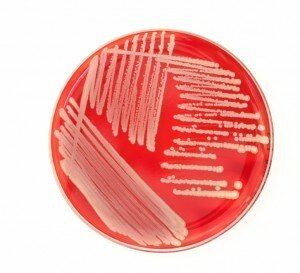 The research community may be a little closer to agreement on how to reach the common goal of reducing methicillin-resistant Staphylococcus aureus (MRSA) infections in intensive care units (ICUs). Which approach is more effective: universal decolonization or screening and treating only those found positive for MRSA? According to a study in the New England Journal of Medicine, universal decolonization was more effective and efficient than the alternatives: screening with isolation or screening with isolation and decolonization. That’s good news as eliminating screening and reducing the requirement for isolation makes universal decolonization easier to implement.
The research community may be a little closer to agreement on how to reach the common goal of reducing methicillin-resistant Staphylococcus aureus (MRSA) infections in intensive care units (ICUs). Which approach is more effective: universal decolonization or screening and treating only those found positive for MRSA? According to a study in the New England Journal of Medicine, universal decolonization was more effective and efficient than the alternatives: screening with isolation or screening with isolation and decolonization. That’s good news as eliminating screening and reducing the requirement for isolation makes universal decolonization easier to implement.
Universal decolonization involves washing every ICU patient daily with chlorhexidine-impregnated cloths and administering intranasal mupirocin treatments twice-daily for 5 days . This practice has been shown to reduce MRSA infections among that population by 37% and bloodstream infection by any pathogen by 44%. Chlorhexidine’s broad antimicrobial activity means that it’s also helpful in preventing infections from many pathogens besides MRSA.
The study, which involved over 74,000 patients at 43 hospitals over a three-year period, has potential implications for ICU practices and protocols. In an accompanying editorial titled “Screening Inpatients for MRSA – Case Closed,” the writers recommend that hospitals stop screening as the practice hasn’t proved as effective as universal decolonization. They also recommend the repeal of laws mandating screening. Nine states have such laws in effect.
Contrary to the NEJM editorial, a guest blogger at Controversies in Hospital Infection Prevention, cites better infection reduction outcomes at his hospital using a targeted screening, isolation and decolonization protocol than the cited NEJM study achieved with universal decolonization. He also highlighted the issues of increased mupirocin and chlorhexidine resistance that may result from more widespread use of those antimicrobials. The guest blogger ended by recommending critical evaluation and risk assessment to determine the best approach at each facility.
PurThreadTM Technologies Inc. is dedicated to developing proprietary antimicrobial textile technology. Our patent-pending, integration technology and fiber formulations incorporate an EPA-registered antimicrobial additive into every fiber and yarn to protect the fabric from degradation. Learn more about our antimicrobial textile technology.
PurThread also makes a range of freshness products for other markets such as the military, emergency first responders and performance athletic wear in which our next-generation technology and fiber formulations expand the high performance options available to protect fabrics from odor, mold and mildew causing bacteria.
Speak Your Mind